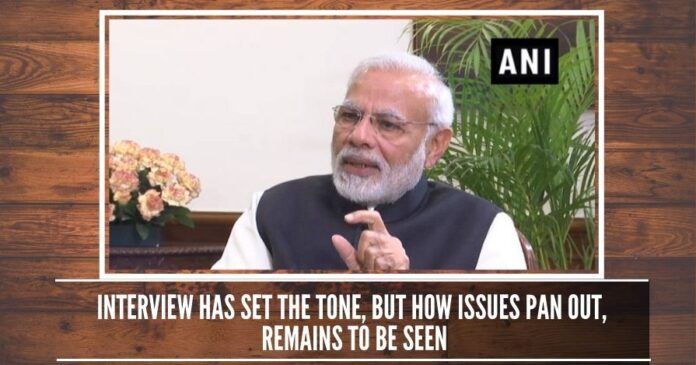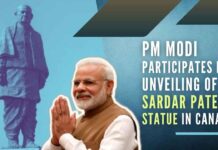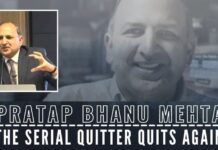
Modi deftly positioned the contest as being not between Modi and grand alliance but between the people and the grand alliance
It is being said that Prime Minister Narendra Modi’s interview to the news agency ANI, aired on the first day of 2019, has set the tone for the coming Lok Sabha election. This is true to the extent that the counters of the narrative the Bharatiya Janata Party will promote in the coming days, have been established. In doing so, Prime Minister Modi donned the hats of both an institutionalist and shrewd politician.
Modi was at his best as both a party leader and an institutionalist (Prime Minister) when he responded to the surgical strike Indian forces had conducted into Pakistan and the response of his political rivals to the decision
There is now greater clarity on certain contentious issues which have invited conflicting opinions within the party and the larger Sangh family in the past few weeks. For instance, take the construction of a Ram temple at the disputed site in Ayodhya. Modi played the institutionalist by stating that the Government would consider stepping in after the ongoing judicial process was done with. It was an expression of respect for the judiciary as an institution. At the same time, the Prime Minister also catered to his constituents by keeping the door of Government intervention open, by remarking that his regime was “ready to make all efforts” once the judiciary had done its bit. This should keep the RSS and those within the Government who want the Government to intervene sooner than later, satisfied.
Of course, there is still a bit of uncertainty: What if the Supreme Court does not plan to settle the matter soon? Will the Modi regime keep waiting? Interestingly, the Prime Minister did not specifically say that the Government would wait until the verdict. The ‘judicial process’ he referred to, can also be a reference to the apex court’s stand on January 4 or soon thereafter. Thus, by being paradoxically both clear and vague, Modi walked the tightrope between respecting the law of the land and the immediate political compulsions.
As an institutionalist, he also sought to differentiate between the personal and the institution in the Reserve Bank of India’s case. He brushed aside the controversy over Urjit Patel’s abrupt resignation as Governor, informing that Patel had at least six months ago informed him of his desire to quit for personal reasons. That being the case, the claim of his rivals that his Government had hounded Patel, does not hold true. However, this does not take away from the deep differences Patel had with the Union Finance Ministry on certain matters, including the Government’s desire to tap into the RBI’s reserve funds.
Modi was at his best as both a party leader and an institutionalist (Prime Minister) when he responded to the surgical strike Indian forces had conducted into Pakistan and the response of his political rivals to the decision. He pointed out that his party had not politicised the matter but that it had to wade into the issue once the opposition parties began to question the Indian Army’s claim and the Government’s intent. While the Prime Minister in him said that it was his duty and the responsibility of his Government to publicly commend the success of the Armed Forces, the politician in him stated that various opposition party leaders were saying the exact same thing that Pakistan was, after the surgical strike.
The overwhelming challenge to the party comes from the (work-in-progress) grand alliance formula of various opposition parties.
The politician in the Prime Minister was most evident when it came to the issue of corruption. The way he postulated on the subjected gives clear indications that it would be a key election point for the BJP. He pointed out that key members of the so-called first family of the Congress were out on bail, facing serious charges of financial misappropriation. Another prominent Congress leader and a former Finance Minister was “making rounds of the courts” to avoid arrest. The idea obviously is to present the ‘corrupt’ face of the Congress in the coming election alongside with that of the ‘clean’ image of the Government on the issue of Rafale — which the Congress has gone to town with as a case of graft against the Modi regime.
Armed with a positive apex court verdict on the Rafale deal, the Prime Minister remarked that he had already elaborated on the matter in Parliament and in his public meetings and that it made no sense to keep responding to people who were stricken by verbal diarrhoea. Modi dramatically said in the interview that he would continue to take steps to strengthen the country’s Armed Forces, regardless of the muck thrown at him. “I won’t leave my Army jawans to their fate”: This is in keeping with the muscular image he has cultivated over the years. But more importantly, it reveals that the BJP will make the Rafale matter an important election issue, juxtaposing it with the ‘Congress leaders on bail in graft cases’ issue.
If the Prime Minister was somewhat circumspect on the temple issue, he was unambiguous on the Sabarimala controversy. He made it known that the latter was a matter of faith — unlike instant triple divorce among the Muslim community, which was a gender equality subject. He pointed out that there were temples where men weren’t allowed. Modi’s clarity on the matter — especially his remark that the issues of triple divorce and Sabarimala were incomparable — would embolden his party in Kerala to tap into the latent anger against the Left regime there and be less defensive when the comparison is made by its rivals to embarrass the BJP.
But all of these are only parts of the grand narrative that the BJP is seeking to build. The overwhelming challenge to the party comes from the (work-in-progress) grand alliance formula of various opposition parties. In response to a question, Modi deftly positioned the contest as being not between Modi and grand alliance but between the people and the grand alliance. In one stroke, he sought to place himself on the people’s side and the alliance as against their aspirations. Will this strategy work? It won’t be long before we know the answer.
Note:
1. The views expressed here are those of the author and do not necessarily represent or reflect the views of PGurus.











BTW, this list of questions must be from Lutyens crowd. Who prepared it?
The sad part of this interview, and of last four and half years of BJP rule is that nobody has managed to ask the PM even one searching question about BJP commitment to Indian culture and civilization.
This article shows the complete failure of this website in particular, and of the BJP sympathisers in general. They never set the agenda. They merely react.
A repeat of ‘Indira is India and India is Indira’s mantra!!
Every nationalist should support Modiji since he has been trying his best to develop India and to improve the image of the country in the world. If we loose the chance this time, we will be suffering for decades to come.
“Modi deftly positioned the contest as being not between Modi and grand alliance but between the people and the grand alliance”.
Depending on urban PEOPLE/VOTERS who do not come out and Vote??
Grand Alliance is on falsehood mission which catches fire such as farm loan waivers/unemployment pocket money………………….
while BJP failed to advertise its “achievements”. It seems BJP’s IT cell is sleeping or hand in glove with grand alliance!! its the few “unpaid individuals/patriots” tabulated BJPs achievements much better than the Government /IT cell put together.
It was reported that sometime during 1997-2004 NDA government helped Congressmen Rahul Gandhi who was caught having more then stipulated foreign currency in his pockets in USA and present NDA government wakening up to mega scams of UPA1&2 did damage to the Indian democracy and BJP sympathizers. Look at the way Rahul and team is playing with our defense forces and spreading lies on Rafael…and winning elections…… On Dynasty scams and bails Rahul intelligently asked his party-men to defend………
This Narrative “people versus Mahagatbandhan” during 2019 is utter nonsense.
BJP is anything but a party with muscular image. It is a party of sermons….sermons to the followers and voters about something or other. Accommodation to opponents on everything. No?